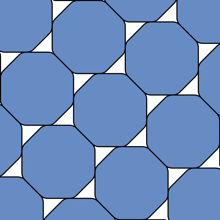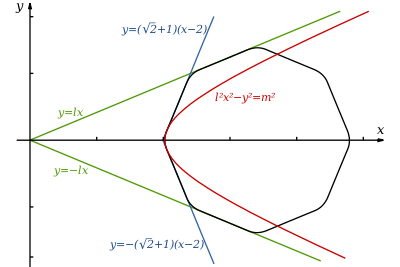Smoothed octagon


The smoothed octagon is a region in the plane conjectured to have the lowest maximum packing density of the plane of all centrally symmetric convex shapes.[1] It is constructed by replacing the corners of a regular octagon with a section of a hyperbola that is tangent to the two sides adjacent to the corner and asymptotic to the sides adjacent to these.
The smoothed octagon has a maximum packing density given by
This is lower than the maximum packing density of circles, which is
The maximum packing density of the ordinary regular octagon is
also slightly less than the maximum packing density of circles, but higher than that of the smoothed octagon.[3]
The smoothed octagon achieves its maximum packing density, not just for a single packing, but for a 1-parameter family. All of these are lattice packings.[4]
In three dimensions, Ulam's packing conjecture states that no convex shape has a lower maximum packing density than the ball.
Construction

By considering the family of maximally dense packings of the smoothed octagon, the requirement that the packing density remain the same as the point of contact between neighbouring octagons changes can be used to determine the shape of the corners. In the figure, three octagons rotate while the area of the triangle formed by their centres remains constant, keeping them packed together as closely as possible. For regular octagons, the red and blue shapes would overlap, so to enable the rotation to proceed the corners are clipped by a point that lies halfway between their centres, generating the required curve, which turns out to be a hyperbola.

The hyperbola is constructed tangent to two sides of the octagon, and asymptotic to the two adjacent to these. The following details apply to a regular octagon of circumradius  with its centre at the point
with its centre at the point  and one vertex at the point
and one vertex at the point  . We define two constants, ℓ and m:
. We define two constants, ℓ and m:
The hyperbola is then given by the equation
or the equivalent parameterization (for the right-hand branch only):
The portion of the hyperbola that forms the corner is given by
The lines of the octagon tangent to the hyperbola are
The lines asymptotic to the hyperbola are simply
See also
References
- ↑ K. Reinhardt, Über die dichteste gitterförmige Lagerung kongruenter bereiche in der ebene und eine besondere art konvexer Kurven, Abh. Math. Sem. Hamburg 10, 216-230 (1934).
- ↑ Weisstein, Eric W., "Smoothed Octagon", MathWorld.
- ↑ Steven Atkinson, Yang Jiao and Salvatore Torquato, Maximally dense packings of two-dimensional convex and concave noncircular particles, Phys. Rev. E 86 (2012), 031302. Also available online.
- ↑ Yoav Kallus, Least efficient packing shapes, Geometry and Topology, in press. Also available online.
External links
- The thinnest densest two-dimensional packing?. Peter Scholl, 2001.




![m = \sqrt[4]{\frac{1}{2}}](../I/m/82e3e9e7b5309b4af97c76749b368e34.png)




